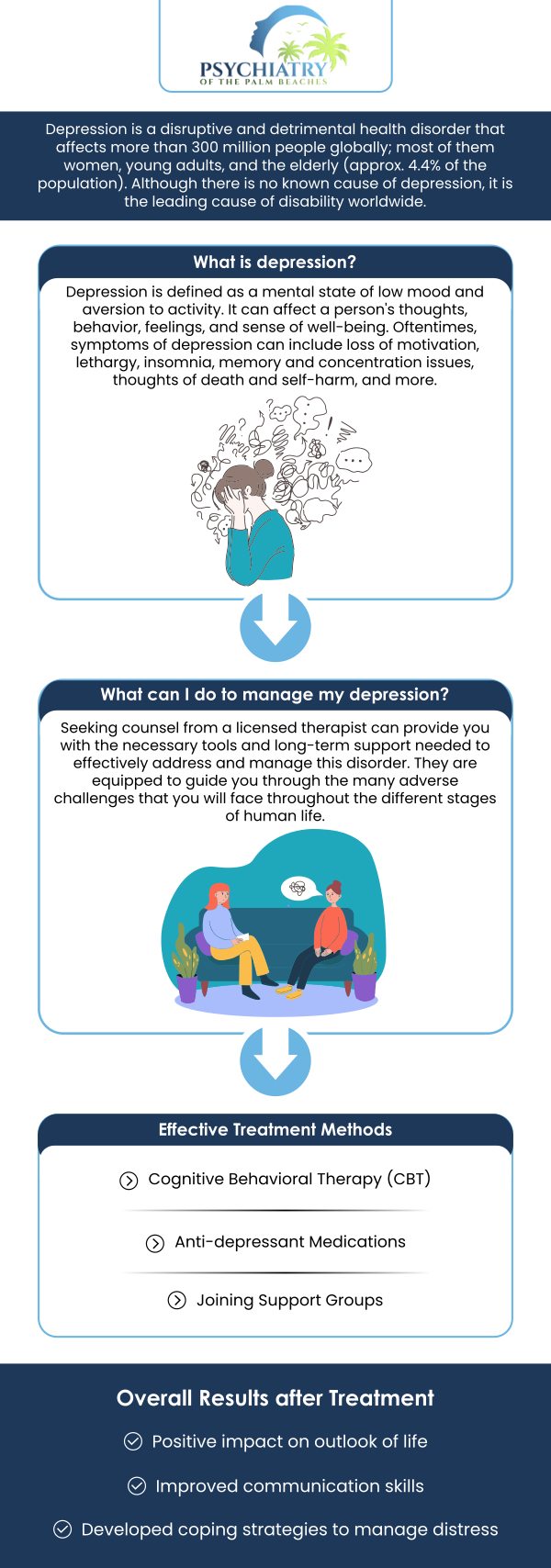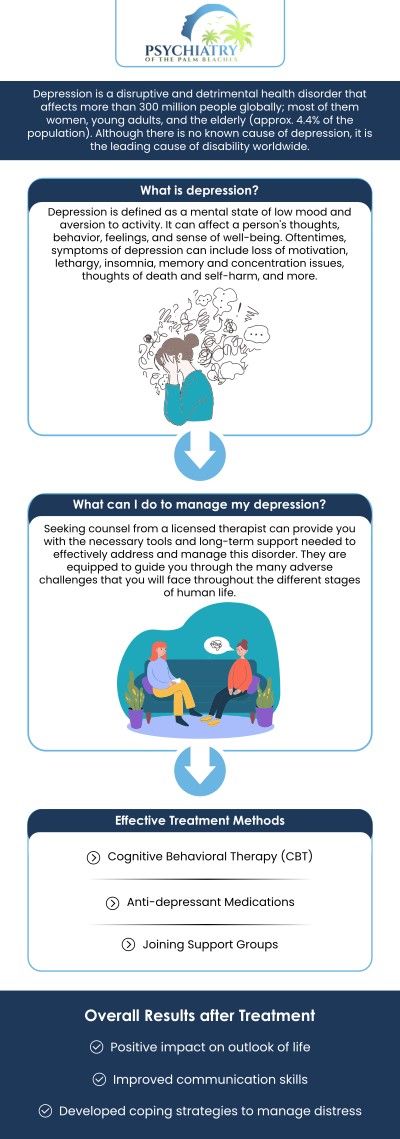Postpartum Depression Treatment Specialist in Melbourne, FL
If you are a new mother experiencing signs of postpartum depression, understand that you are not alone. Many women experience feelings of sadness, anxiety, or hopelessness after giving birth. These emotions can be overwhelming, making it challenging to care for yourself or your child. Dr. David Husted at Psychiatry of the Palm Beaches offers compassionate and effective treatment options for postpartum depression. For more information, please contact us or book an appointment online. We are conveniently located at 6300 North Wickham Road Suite 110 Melbourne, FL 32940.




Table of Contents:
How can postpartum depression differ from the “baby blues”?
Can postpartum depression affect the bonding process with my baby?
What are the challenges in diagnosing postpartum depression?
How do I differentiate between normal stress and postpartum depression?
At Psychiatry of the Palm Beaches, we comprehend the emotional challenges that can come along with childbirth, such as Postpartum Depression (PPD) and the “baby blues”. These conditions, although both related to emotional distress post-childbirth, differ significantly in terms of onset, duration, intensity, symptoms, risk factors, and required treatment.
The “baby blues”, characterized by mild sadness, irritability, anxiety, and sleep disturbances, are experienced by many new mothers and typically resolve on their own within a week or two following childbirth. However, PPD is a more severe condition that can begin anytime within the first year after childbirth and persist for several weeks or longer. Symptoms of PPD include persistent sadness, anhedonia (loss of pleasure), feelings of worthlessness or guilt, difficulty concentrating, and thoughts of self-harm or harming the baby.
We recognize the significance of the early detection and management of PPD, as it can significantly improve outcomes for both the mother and baby. We provide personalized treatment plans that may involve psychotherapy, medication, or a combination of both to help mothers manage and overcome this challenging condition.
At Psychiatry of the Palm Beaches, we know that the postpartum period, or the period following childbirth, is an extremely significant and vulnerable time for new moms. Postpartum depression is a serious psychological condition that may negatively impact the development of bonds between mother and child, and is a major concern during this time.
PPD typically shows up within the first few weeks after childbirth, however, it may arise at any point within the first year. It is distinguished by chronic feelings of sadness, fear, and exhaustion, as well as mood swings, panic attacks, difficulties sleeping or focusing, feelings of worthlessness or guilt, and even delusions or hallucinations. In some severe cases, mothers may experience suicidal thoughts. These symptoms may disrupt a mother’s capacity to care for both her child and herself.
At Psychiatry of the Palm Beaches, one of our primary concerns with postpartum depression is its potential to affect the mother-infant bond. This bond is a crucial aspect of a newborn’s development and a mother’s mental health. Mothers with PPD often find themselves feeling emotionally detached from their baby, struggling to respond to their baby’s needs, and feeling inadequate as a parent. This struggle can sometimes lead to what’s known as ‘attachment issues,’ which can interfere with the baby’s development. The joy and happiness that typically accompanies having a baby can be overshadowed by PPD.
If you are experiencing symptoms of PPD, don’t hesitate to seek help. Reach out to our team at Psychiatry of the Palm Beaches. With our support, you can recover and create a strong bond with your baby.
At Psychiatry of the Palm Beaches, we recognize the intricacies and difficulties associated with diagnosing Postpartum Depression (PPD), a serious mental health illness that affects many moms following childbirth.
Symptom Overlap:
PPD presents with subtle symptoms that often align with common postpartum experiences, including fatigue, decreased libido, and sleep disturbances. These similarities often blur the line between regular hormonal changes after delivery and PPD, making it difficult to diagnose accurately.
Awareness and Understanding:
Our team is committed to increasing awareness and understanding of PPD among both our patients and healthcare providers. We strive to dispel the misconceptions surrounding PPD, such as its confusion with ‘baby blues’ or simply being a normal part of motherhood. A delayed diagnosis due to these misunderstandings only serves to worsen the condition.
Stigma:
At Psychiatry of the Palm Beaches, we acknowledge the societal stigma surrounding mental health issues, especially about motherhood. We foster a supportive and non-judgmental environment, encouraging mothers to express their feelings openly and seek help without fear of societal judgment.
Differential Diagnosis:
Our experienced psychiatrists are skilled in differentiating PPD from other conditions, such as postpartum blues, bipolar disorder, anxiety disorders, and hypothyroidism. We understand that PPD can present with a wide range of symptoms, some of which may not traditionally be associated with depression.
We are dedicated to overcoming these challenges in diagnosing PPD. Through increasing awareness, reducing stigma, improving screening tools, and dedicating adequate resources, we aim to ensure that all mothers receive the help they need and deserve.
At Psychiatry of the Palm Beaches, we understand the challenges that new mothers face, particularly in differentiating between normal stress and postpartum depression. These two conditions can sometimes present overlapping symptoms, making it difficult to identify the true nature of what you’re experiencing.
After childbirth, it’s completely natural to feel a certain level of stress. You may feel overwhelmed and struggle to focus, make decisions, or experience mood swings. These are common signs of normal stress and are often a response to the major changes that come with having a new baby. However, these feelings are usually temporary and ease with rest, self-care, and the support of loved ones.
However, if your feelings persist and grow in intensity, you may be dealing with postpartum depression. This is a serious clinical condition that is more intense and lasts longer than normal stress. Symptoms of postpartum depression include prolonged sorrow, feelings of worthlessness, significant mood swings, trouble bonding with the infant, and suicidal ideation.
Our team specializes in distinguishing between normal stress and postpartum depression. The most significant difference is the severity and duration of symptoms. While normal stress is usually manageable and temporary, symptoms of postpartum depression are chronic and intense, and can worsen over time without treatment.
If you experience persistent or worsening symptoms, if they interfere with your everyday activities, or if you have suicidal thoughts, please contact us. We can give you an accurate diagnosis and direct you to successful treatment alternatives. For more information, please contact us or book an appointment online. We are conveniently located at 6300 North Wickham Road Suite 110 Melbourne, FL 32940. We serve patients from Melbourne FL, Palm Bay FL, Suntree FL, Viera West FL, Satellite Beach FL, West Melbourne FL, and surrounding areas.
Check Out Our 5 Star Reviews



Additional Services You May Need
▸ Mental Wellness
▸ Relationship Coaching
▸ Depression and Mood Disorders
▸ Women’s Health
▸ Panic Disorder
▸ Medications Management
▸ Men’s Health
▸ Individual Psychotherapy
▸ Bipolar
▸ ADHD
▸ Geriatric Mental Health
▸ Couple’s Counseling
▸ Obsessive Compulsive Disorder
▸ Social Phobia Treatment
▸ Eating Disorders
▸ Post Traumatic Stress Disorder
▸ Psychotic Disorders


